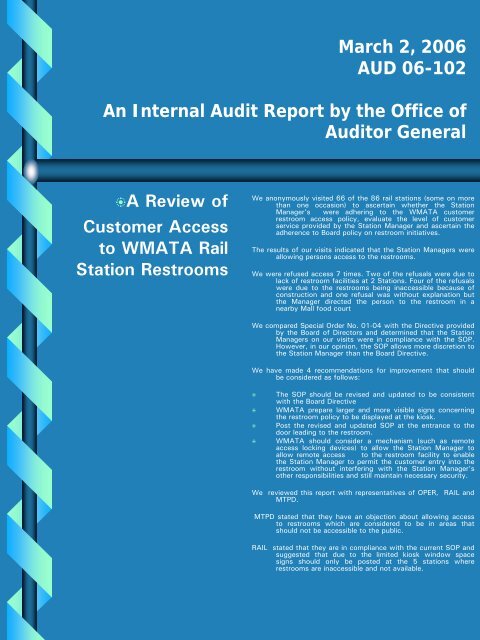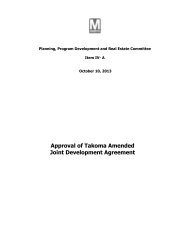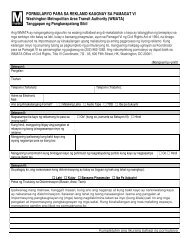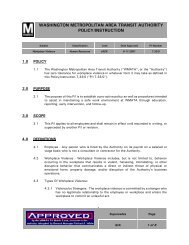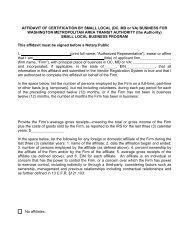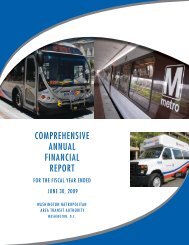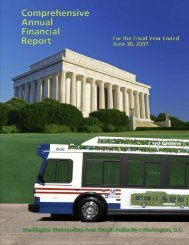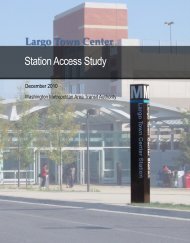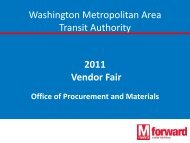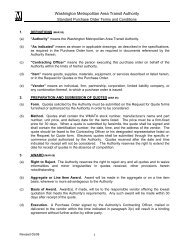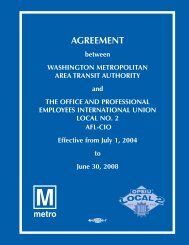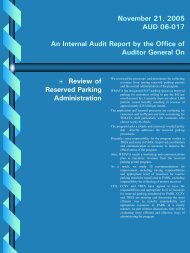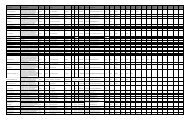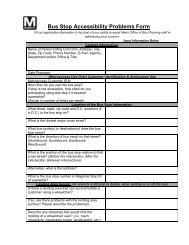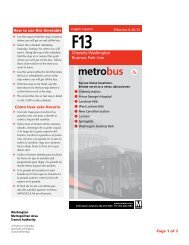Customer Access to Restrooms Report - WMATA.com
Customer Access to Restrooms Report - WMATA.com
Customer Access to Restrooms Report - WMATA.com
You also want an ePaper? Increase the reach of your titles
YUMPU automatically turns print PDFs into web optimized ePapers that Google loves.
March 2, 2006<br />
AUD 06-102<br />
An Internal Audit <strong>Report</strong> by the Office of<br />
Audi<strong>to</strong>r General<br />
A Review of<br />
<strong>Cus<strong>to</strong>mer</strong> <strong>Access</strong><br />
<strong>to</strong> <strong>WMATA</strong> Rail<br />
Station <strong>Restrooms</strong><br />
We anonymously visited 66 of the 86 rail stations (some on more<br />
than one occasion) <strong>to</strong> ascertain whether the Station<br />
Manager’s were adhering <strong>to</strong> the <strong>WMATA</strong> cus<strong>to</strong>mer<br />
restroom access policy, evaluate the level of cus<strong>to</strong>mer<br />
service provided by the Station Manager and ascertain the<br />
adherence <strong>to</strong> Board policy on restroom initiatives.<br />
The results of our visits indicated that the Station Managers were<br />
allowing persons access <strong>to</strong> the restrooms.<br />
We were refused access 7 times. Two of the refusals were due <strong>to</strong><br />
lack of restroom facilities at 2 Stations. Four of the refusals<br />
were due <strong>to</strong> the restrooms being inaccessible because of<br />
construction and one refusal was without explanation but<br />
the Manager directed the person <strong>to</strong> the restroom in a<br />
nearby Mall food court<br />
We <strong>com</strong>pared Special Order No. 01-04 with the Directive provided<br />
by the Board of Direc<strong>to</strong>rs and determined that the Station<br />
Managers on our visits were in <strong>com</strong>pliance with the SOP.<br />
However, in our opinion, the SOP allows more discretion <strong>to</strong><br />
the Station Manager than the Board Directive.<br />
We have made 4 re<strong>com</strong>mendations for improvement that should<br />
be considered as follows:<br />
<br />
<br />
<br />
<br />
The SOP should be revised and updated <strong>to</strong> be consistent<br />
with the Board Directive<br />
<strong>WMATA</strong> prepare larger and more visible signs concerning<br />
the restroom policy <strong>to</strong> be displayed at the kiosk.<br />
Post the revised and updated SOP at the entrance <strong>to</strong> the<br />
door leading <strong>to</strong> the restroom.<br />
<strong>WMATA</strong> should consider a mechanism (such as remote<br />
access locking devices) <strong>to</strong> allow the Station Manager <strong>to</strong><br />
allow remote access <strong>to</strong> the restroom facility <strong>to</strong> enable<br />
the Station Manager <strong>to</strong> permit the cus<strong>to</strong>mer entry in<strong>to</strong> the<br />
restroom without interfering with the Station Manager’s<br />
other responsibilities and still maintain necessary security.<br />
We reviewed this report with representatives of OPER, RAIL and<br />
MTPD.<br />
MTPD stated that they have an objection about allowing access<br />
<strong>to</strong> restrooms which are considered <strong>to</strong> be in areas that<br />
should not be accessible <strong>to</strong> the public.<br />
RAIL stated that they are in <strong>com</strong>pliance with the current SOP and<br />
suggested that due <strong>to</strong> the limited kiosk window space<br />
signs should only be posted at the 5 stations where<br />
restrooms are inaccessible and not available.
Questions<br />
Internal Audit <strong>Report</strong><br />
No. AUD 06-102<br />
<br />
If you have any questions or <strong>com</strong>ments<br />
pertaining <strong>to</strong> this Internal Audit <strong>Report</strong>,<br />
please contact:<br />
James C.<br />
Stewart<br />
962-1008<br />
1008
SUBJECT: Review of <strong>Cus<strong>to</strong>mer</strong> <strong>Access</strong> <strong>to</strong> DATE: March 2, 2006<br />
<strong>WMATA</strong> Rail Station <strong>Restrooms</strong><br />
FROM: ASOT – James C. Stewart<br />
TO: OPER – James Hughes<br />
IN REPLY<br />
REFER TO: AUD 06-102<br />
Background<br />
At the request of the General Manager, we conducted a review of <strong>WMATA</strong>’s rail cus<strong>to</strong>mer<br />
restroom access <strong>to</strong> see whether or not the Station Manager’s were adhering <strong>to</strong> the policy as<br />
proscribed by the Board of Direc<strong>to</strong>rs. This review was the result of cus<strong>to</strong>mer <strong>com</strong>plaints that<br />
various Station Managers were not permitting cus<strong>to</strong>mers access <strong>to</strong> restrooms facilities upon<br />
request. We reviewed <strong>WMATA</strong>’s restroom access policy, which was prepared as a result of<br />
the Board of Direc<strong>to</strong>r’s program initiative of November 20, 2003. The “Station Operations<br />
Special Order” No. 04-01 dated March 17, 2004 in section 31.1 Scopes and Purposes, states<br />
that “the Station Manager on duty has sole discretion <strong>to</strong> accept or reject cus<strong>to</strong>mer requests for<br />
use of facilities.”<br />
<strong>WMATA</strong> has 86 rail stations, some with multiple entrances and kiosks that support its 110<br />
mile subway system. The rail stations are managed by Station Managers who report <strong>to</strong> Rail<br />
Operations Supervisors. The supervisors, according <strong>to</strong> the stated policy, “must ensure that<br />
restrooms signs are posted at each Metrorail station kiosk.” Additionally, the Station<br />
Manager must notify the Passenger Operations Supervisor of any unusual situation regarding<br />
restrooms facilities.<br />
The appearance of inconsistencies, inaccessibility and the public perception that Metro<br />
cus<strong>to</strong>mers are not allowed access <strong>to</strong> available restroom facilities has caused confusion among<br />
not only the public but within Metro’s management. Therefore, this evaluation was<br />
conducted <strong>to</strong> review access <strong>to</strong> the restrooms based on our requests of Station Managers <strong>to</strong> use<br />
restroom facilities without identifying ourselves as <strong>WMATA</strong> employees.<br />
1
AUD 06-102<br />
Objectives, Scope and Methodology<br />
The objectives of our review were <strong>to</strong>: (1) ensure whether the Station Managers were adhering <strong>to</strong> the<br />
<strong>WMATA</strong> cus<strong>to</strong>mer restroom access policy, (2) evaluate the level of cus<strong>to</strong>mer service provided by<br />
the Station Manager, (3) inspect the restroom facilities for cleanliness, and (4) ascertain the<br />
adherence <strong>to</strong> Board policy on restroom initiatives.<br />
The scope of our review included all 86 <strong>WMATA</strong> rail stations, including those stations with more<br />
than one entrance and kiosk. The review was conducted between November 15, 2005 and December<br />
31, 2005.<br />
We were <strong>to</strong> visit each of the 86 stations and ask the Station Manager on duty <strong>to</strong> use the restroom.<br />
Each Station Manager was asked the same question derived from a prepared script. If we were<br />
allowed access <strong>to</strong> the restroom, we inspected the facility for cleanliness. We also evaluated the level<br />
of cus<strong>to</strong>mer service the Station Managers provided by assessing their response, body language, the<br />
<strong>to</strong>ne of their voice and other fac<strong>to</strong>rs. The level of the Station Manager’s cus<strong>to</strong>mer service was<br />
evaluated whether or not we were allowed access <strong>to</strong> the restrooms.<br />
Visits <strong>to</strong> the stations were conducted twice, once during the morning hours and once during the<br />
evening hours. This was done in an attempt <strong>to</strong> ensure that a different Station Manager was on duty<br />
during each visit even though we were aware that Station Managers rotate their assignments. The<br />
visits were spread out over the course of approximately 45 days <strong>to</strong> ensure that each kiosk at each<br />
station was surveyed.<br />
Visits <strong>to</strong> the restrooms were conducted anonymously by AUDT staff. We asked <strong>to</strong> use the restrooms<br />
without identifying ourselves as <strong>WMATA</strong> employees. However, we were unable <strong>to</strong> <strong>com</strong>plete visits<br />
<strong>to</strong> all 86 stations because we were informed that the Station Managers became aware of our<br />
assignment. As a result, we were only able <strong>to</strong> conduct 94 visits <strong>to</strong> 66 (or 77 percent) of the 86<br />
stations.<br />
On November 20, 2003, the Board of Direc<strong>to</strong>rs approved “New Programmatic Restroom Initiatives.”<br />
The presentation <strong>to</strong> the Board included the following initiatives:<br />
• Station restrooms will be converted from men and women’s restrooms <strong>to</strong> <strong>Cus<strong>to</strong>mer</strong> and<br />
Employee restrooms.<br />
• SOP’s will be framed and mounted on or near Ancillary doors leading <strong>to</strong> restroom<br />
entrance ways and kiosk signs/decals will be fabricated as shown in the presentation.<br />
• The presentation stated that Station Managers can refuse restroom use only if one of the<br />
following criteria is met:<br />
- The Station Manager’s personal safety is at risk<br />
- There is an ongoing emergency on a train, in the station or on the right-of-way<br />
requiring the Station Manager’s immediate attention<br />
- The presentation stated that emergencies include sick cus<strong>to</strong>mers, station<br />
overcrowding, widespread fare equipment failure or a person on the track bed.<br />
2
AUD 06-102<br />
• The presentation stated that cus<strong>to</strong>mers will be advised of the revised procedures by:<br />
- Posted signs regarding restroom availability in the kiosk, along with Metro’s<br />
cus<strong>to</strong>mer service telephone number<br />
- Posting revised procedures on or near Ancillary doors<br />
- Updating Metro’s internet website <strong>to</strong> inform cus<strong>to</strong>mers of restroom<br />
initiatives.<br />
As a result, on March 12, 2004, <strong>WMATA</strong> Station Operations Special Order 04-01 was issued <strong>to</strong> all<br />
personnel. Special Order 04-01 modified Special Order 03-02 and SSOP 31 pertaining <strong>to</strong> the use of<br />
restrooms in Metrorail passenger stations. The Special Order showing “bold and underlined”<br />
sections and “strikeouts” delineating the changes <strong>to</strong> the procedures.<br />
The Special Order states that “The Station Manager on duty has sole discretion <strong>to</strong> accept or reject<br />
cus<strong>to</strong>mer requests for use of facilities.” The Special Order also states that <strong>WMATA</strong>’s “policy is <strong>to</strong><br />
make a restroom available <strong>to</strong> cus<strong>to</strong>mers in limited circumstances. The limitation is necessary <strong>to</strong><br />
control crime and maintain security.” The Special Order provides that 5 stations will have no<br />
restrooms available <strong>to</strong> cus<strong>to</strong>mers. The 5 stations are Pentagon, Vienna, Rhode Island Avenue,<br />
Addison Road and Congress Heights.<br />
The Special Order also specified the circumstances under which the restrooms will be made<br />
available <strong>to</strong> cus<strong>to</strong>mers as follows:<br />
• in an emergency situation<br />
• for children<br />
• for cus<strong>to</strong>mers who are elderly or physically disabled.<br />
The Special Order specifies the circumstances under which restrooms will not be made available <strong>to</strong><br />
cus<strong>to</strong>mers as follows:<br />
• Department of Homeland Security Alert level status Orange or Red<br />
• Metro Transit Police Chief determines, based on contemporary intelligence provided by<br />
FBI, DHS, FTA or other agency, of a potential threat <strong>to</strong> transit operations<br />
• Terrorist attack occurs in the United States or in another country which would normally<br />
raise <strong>WMATA</strong>’s preparedness levels.<br />
The Special Order also stated that:<br />
“The Station Manager must escort the cus<strong>to</strong>mer <strong>to</strong> the ancillary hallway where the restroom<br />
is located and direct him/her <strong>to</strong> the <strong>Cus<strong>to</strong>mer</strong>’s Restroom, then return <strong>to</strong> normal duties. <strong>Cus<strong>to</strong>mer</strong>s<br />
will be allowed <strong>to</strong> exit the restroom, without the Station Manager’s assistance, through the ancillary<br />
hallway door. After the cus<strong>to</strong>mer exits the hallway, the Station Manager shall ensure that the<br />
ancillary hallway door is secured.<br />
3
AUD 06-102<br />
The Special Order allows for the following reasons that a Station Manager may refuse access,<br />
including the following:<br />
A. Employee’s personal safety, and the specific reason (s) therefore<br />
B. Station/train emergencies in progress in the station<br />
C. Assisting sick cus<strong>to</strong>mer at the station<br />
D. Severe overcrowding of the station<br />
E. Fare equipment malfunctions which require the Station Manager <strong>to</strong> assist cus<strong>to</strong>mers.<br />
F. VRE, MARC or Amtrak service disruptions which require the Station Manager <strong>to</strong> direct<br />
cus<strong>to</strong>mers <strong>to</strong> locations <strong>to</strong> continue their trips at affected station only.<br />
G. Any track wayside incident taking place in the station.<br />
H. A medical emergency in the station or on a train in the station.<br />
I. A police situation<br />
In January 2006, we visited all Rail Stations and Kiosks <strong>to</strong> determine whether the Kiosk had bathroom<br />
signage and whether the SOP was posted at the bathroom entrance door. The results of our visits were as<br />
follows:<br />
Yes<br />
No<br />
Visible Signs 31 73<br />
SOP Posted 71 27<br />
Conclusion<br />
Because we were unable <strong>to</strong> visit all stations as intended, we were only able <strong>to</strong> conduct 94 visits at 66 (or 77<br />
percent) of the 86 stations. However, the results from the <strong>com</strong>pleted visits provided us with sufficient data <strong>to</strong><br />
evaluate the access <strong>to</strong> restrooms. The results of our survey indicated that the Station Managers were allowing<br />
persons access <strong>to</strong> the restrooms. Furthermore most of the Station Managers were courteous and provided<br />
acceptable cus<strong>to</strong>mer service when responding <strong>to</strong> our requests.<br />
We reviewed Station Operations Special Order No. 04-01 dated March 17, 2004 and the Board of Direc<strong>to</strong>r’s<br />
Minutes of November 20, 2003, Item C, “Approval of New Programmatic Restroom Initiatives,” and<br />
concluded that, based upon the results of our survey; the Station Managers were adhering <strong>to</strong> the stated policy<br />
during our visits<br />
Our review of the Board Policy and the SOP discloses that the written SOP is more “open” than the Board<br />
Policy in that it gives the Station Manager more discretion in allowing cus<strong>to</strong>mers <strong>to</strong> use the <strong>Restrooms</strong> than<br />
the Policy anticipated.<br />
4
AUD 06-102<br />
Results of Audit<br />
We were able <strong>to</strong> conduct 94 visits at 66 (77 percent) of the 86 stations before we terminated the review<br />
because the Station Managers were aware of our visits. The results of our survey are summarized in Schedule<br />
1.<br />
The results of our survey indicate that of the 94 visits conducted, Station Managers refused us access seven<br />
times. Of the seven refusals, two refusals were because the stations did not have public restrooms (Addison<br />
Road and Vienna). These two stations were, according <strong>to</strong> the Station Operations Special Order No. 04-01<br />
paragraph 31.2 “Background,” an exception because they were found <strong>to</strong> “have no restroom available <strong>to</strong><br />
cus<strong>to</strong>mers.” Four of the refusals were because the restrooms were inaccessible because of construction <strong>to</strong> the<br />
restroom, or because the restroom was out-of-service [New Carrol<strong>to</strong>n, Stadium-Armory and Balls<strong>to</strong>n (two<br />
visits <strong>to</strong> Balls<strong>to</strong>n)]. In each of these visits, the Station Managers were courteous and explained reasons for<br />
their refusal. And one refusal (Pentagon City) the Station Manager failed <strong>to</strong> provide an explanation but<br />
directed us <strong>to</strong> use the restroom in the mall’s food court. We noted that six of the seven reasons for refusal<br />
were acceptable reasons.<br />
We have also <strong>com</strong>pared the Special Order No. 01-04 with the directive provided by the Board of Direc<strong>to</strong>rs<br />
and determined that the Station Managers on our visits were in <strong>com</strong>pliance with them. However, the SOP<br />
allows more discretion <strong>to</strong> the Station Manager than the directive.<br />
Re<strong>com</strong>mendations<br />
As a result of our review of the Board’s direction, the Special Review and the result of our survey of the<br />
Rail Stations and their restrooms, we re<strong>com</strong>mend the following:<br />
• The SOP be revised and updated <strong>to</strong> be consistent with the Board Directive and eliminate<br />
the strikeouts in the SOP.<br />
• <strong>WMATA</strong> prepare larger and more visible signs concerning the restroom policy <strong>to</strong> be<br />
displayed at the Kiosk.<br />
• Post the revised and updated SOP at the entrance <strong>to</strong> the door leading <strong>to</strong> the restroom.<br />
• <strong>WMATA</strong> should consider a mechanism (such as remote access locking devices) <strong>to</strong> allow the<br />
Station Manager <strong>to</strong> allow remote access <strong>to</strong> the restroom facility <strong>to</strong> enable the Manager <strong>to</strong><br />
permit the cus<strong>to</strong>mer entry without interfering with the Station Manager’s other<br />
responsibilities and still maintain necessary security.<br />
We have reviewed this report with representatives of OPER, RAIL and MTPD and requested their <strong>com</strong>ments.<br />
MTPD stated that they have an objection about allowing access <strong>to</strong> restrooms which are considered <strong>to</strong> be in<br />
areas that should not be accessible <strong>to</strong> the public.<br />
RAIL responded by restating they are in <strong>com</strong>pliance with the current SOP and suggested that, due <strong>to</strong> the<br />
limited kiosk window space, signs should only be posted at the 5 stations where restrooms are inaccessible<br />
and not available. They also state that the SOPs that have been posted do not have the strikeouts on them.<br />
5
AUD 06-102<br />
RAIL also stated that Anacostia, Naylor Road and West Hyattsville Stations should be included as exceptions<br />
<strong>to</strong> the open policy on restrooms. RAIL suggests that the type of <strong>to</strong>ilet that was installed at Hunting<strong>to</strong>n Station<br />
be installed at Anacostia Station since security is a fac<strong>to</strong>r at the cus<strong>to</strong>mer’s restroom.<br />
James C. Stewart<br />
Audi<strong>to</strong>r General<br />
cc:<br />
GM – Dan Tangherlini<br />
CHOS – Emeka Moneme<br />
SECT – Harold Bartlett<br />
RAIL – Steve Feil<br />
MTPD – Polly Hanson<br />
6


